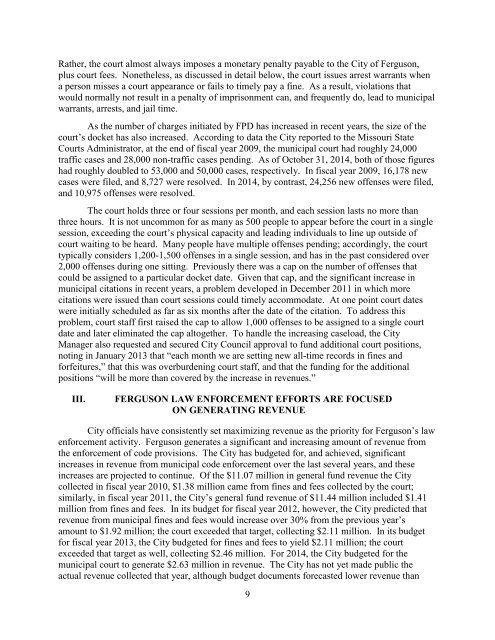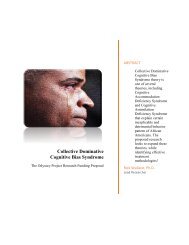U.S. Justice Department Report on the Ferguson Police Department
Ferguson’s law enforcement practices are shaped by the City’s focus on revenue rather than by public safety needs. This emphasis on revenue has compromised the institutional character of Ferguson’s police department, contributing to a pattern of unconstitutional policing, and has also shaped its municipal court, leading to procedures that raise due process concerns and inflict unnecessary harm on members of the Ferguson community.
Ferguson’s law enforcement practices are shaped by the City’s focus on revenue rather than by public safety needs. This emphasis on revenue has compromised the institutional character of Ferguson’s police department, contributing to a pattern of unconstitutional policing, and has also shaped its municipal court, leading to procedures that raise due process concerns and inflict unnecessary harm on members of the Ferguson community.
You also want an ePaper? Increase the reach of your titles
YUMPU automatically turns print PDFs into web optimized ePapers that Google loves.
Ra<strong>the</strong>r, <strong>the</strong> court almost always imposes a m<strong>on</strong>etary penalty payable to <strong>the</strong> City of Fergus<strong>on</strong>,<br />
plus court fees. N<strong>on</strong>e<strong>the</strong>less, as discussed in detail below, <strong>the</strong> court issues arrest warrants when<br />
a pers<strong>on</strong> misses a court appearance or fails to timely pay a fine. As a result, violati<strong>on</strong>s that<br />
would normally not result in a penalty of impris<strong>on</strong>ment can, and frequently do, lead to municipal<br />
warrants, arrests, and jail time.<br />
As <strong>the</strong> number of charges initiated by FPD has increased in recent years, <strong>the</strong> size of <strong>the</strong><br />
court’s docket has also increased. According to data <strong>the</strong> City reported to <strong>the</strong> Missouri State<br />
Courts Administrator, at <strong>the</strong> end of fiscal year 2009, <strong>the</strong> municipal court had roughly 24,000<br />
traffic cases and 28,000 n<strong>on</strong>-traffic cases pending. As of October 31, 2014, both of those figures<br />
had roughly doubled to 53,000 and 50,000 cases, respectively. In fiscal year 2009, 16,178 new<br />
cases were filed, and 8,727 were resolved. In 2014, by c<strong>on</strong>trast, 24,256 new offenses were filed,<br />
and 10,975 offenses were resolved.<br />
The court holds three or four sessi<strong>on</strong>s per m<strong>on</strong>th, and each sessi<strong>on</strong> lasts no more than<br />
three hours. It is not uncomm<strong>on</strong> for as many as 500 people to appear before <strong>the</strong> court in a single<br />
sessi<strong>on</strong>, exceeding <strong>the</strong> court’s physical capacity and leading individuals to line up outside of<br />
court waiting to be heard. Many people have multiple offenses pending; accordingly, <strong>the</strong> court<br />
typically c<strong>on</strong>siders 1,200-1,500 offenses in a single sessi<strong>on</strong>, and has in <strong>the</strong> past c<strong>on</strong>sidered over<br />
2,000 offenses during <strong>on</strong>e sitting. Previously <strong>the</strong>re was a cap <strong>on</strong> <strong>the</strong> number of offenses that<br />
could be assigned to a particular docket date. Given that cap, and <strong>the</strong> significant increase in<br />
municipal citati<strong>on</strong>s in recent years, a problem developed in December 2011 in which more<br />
citati<strong>on</strong>s were issued than court sessi<strong>on</strong>s could timely accommodate. At <strong>on</strong>e point court dates<br />
were initially scheduled as far as six m<strong>on</strong>ths after <strong>the</strong> date of <strong>the</strong> citati<strong>on</strong>. To address this<br />
problem, court staff first raised <strong>the</strong> cap to allow 1,000 offenses to be assigned to a single court<br />
date and later eliminated <strong>the</strong> cap altoge<strong>the</strong>r. To handle <strong>the</strong> increasing caseload, <strong>the</strong> City<br />
Manager also requested and secured City Council approval to fund additi<strong>on</strong>al court positi<strong>on</strong>s,<br />
noting in January 2013 that “each m<strong>on</strong>th we are setting new all-time records in fines and<br />
forfeitures,” that this was overburdening court staff, and that <strong>the</strong> funding for <strong>the</strong> additi<strong>on</strong>al<br />
positi<strong>on</strong>s “will be more than covered by <strong>the</strong> increase in revenues.”<br />
III.<br />
FERGUSON LAW ENFORCEMENT EFFORTS ARE FOCUSED<br />
ON GENERATING REVENUE<br />
City officials have c<strong>on</strong>sistently set maximizing revenue as <strong>the</strong> priority for Fergus<strong>on</strong>’s law<br />
enforcement activity. Fergus<strong>on</strong> generates a significant and increasing amount of revenue from<br />
<strong>the</strong> enforcement of code provisi<strong>on</strong>s. The City has budgeted for, and achieved, significant<br />
increases in revenue from municipal code enforcement over <strong>the</strong> last several years, and <strong>the</strong>se<br />
increases are projected to c<strong>on</strong>tinue. Of <strong>the</strong> $11.07 milli<strong>on</strong> in general fund revenue <strong>the</strong> City<br />
collected in fiscal year 2010, $1.38 milli<strong>on</strong> came from fines and fees collected by <strong>the</strong> court;<br />
similarly, in fiscal year 2011, <strong>the</strong> City’s general fund revenue of $11.44 milli<strong>on</strong> included $1.41<br />
milli<strong>on</strong> from fines and fees. In its budget for fiscal year 2012, however, <strong>the</strong> City predicted that<br />
revenue from municipal fines and fees would increase over 30% from <strong>the</strong> previous year’s<br />
amount to $1.92 milli<strong>on</strong>; <strong>the</strong> court exceeded that target, collecting $2.11 milli<strong>on</strong>. In its budget<br />
for fiscal year 2013, <strong>the</strong> City budgeted for fines and fees to yield $2.11 milli<strong>on</strong>; <strong>the</strong> court<br />
exceeded that target as well, collecting $2.46 milli<strong>on</strong>. For 2014, <strong>the</strong> City budgeted for <strong>the</strong><br />
municipal court to generate $2.63 milli<strong>on</strong> in revenue. The City has not yet made public <strong>the</strong><br />
actual revenue collected that year, although budget documents forecasted lower revenue than<br />
9

















